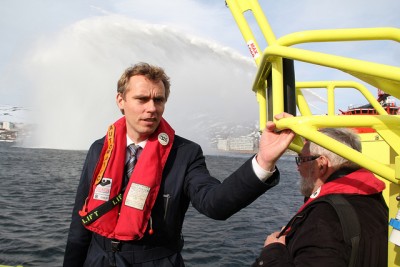Oil & Energy Minister Ola Borten Moe splashed more oil on the simmering battle over the Barents Sea this week when he announced the award of 20 new oil production licenses in the area. He also awarded four more in the Norwegian Sea, and environmentalists were not pleased.

Some of the bullish Norwegian oil minister’s awards allow oil companies to venture closer to the sensitive Arctic waters around Svalbard, and that’s a highly controversial move. Oil companies won permission to look for new sources of oil and gas above 74-degrees latitude and not only environmental groups have been opposed to that. Newspaper Aftenposten noted that countries including Great Britain and Russia have erlier expressed that a border in principle runs along the 74-degree mark. Areas beyond that are in the so-called “Svalbard box” which they don’t think Norway has the right to manage alone.
Moe, in the licenses announced Wednesday in Norway’s 22nd licensing round, granted two nearly as far north as Bjørnøya (Bear Island), the most southerly island in the Svalbard group. GDF Suez of France and Statoil won permission to search for oil in each of their blocs east of the island and just north of 74-degrees latitude.
While some Arctic researchers were expecting diplomatic reaction from, for example, the UK, Lars Haltbrekken of the Norwegian chapter of Friends of the Earth (Naturvernforbundet) was making a last-dich effort to save the southeastern Barents Sea from the oil companies. In a letter to the Parliament’s energy and environmental committee, he urged them to reject a proposal to open the areas for more oil exploration, especially where there’s ice through part of the year. The presence of ice also worries some committee members.
Meanwhile, Moe went ahead with granting production licenses to 29 oil companies on Wednesday. “The companies have demonstrated their strong interest and submitted numerous good applications,” Moe stated. “This confirms that the Norwegian Continental Shelf is a highly interesting petroleum province.”
Two of the 24 production licenses are extensions of existing production licenses, according to the ministry. Officials claimed it was “crucial” to maintain exploration levels “to ensure future actvity through the discovery of new resources.” Licenses awarded this week aren’t expected to result in any production for another 10 to 15 years.
Statoil and Italian oil company Eni were offered three operating licenses, while Total E&P, Repsol, OMV, GDF Suez, E.ON and Det norske oljeselskap were offered two each. Shell, Centrica Resources, ConocoPhillips, Edison International, Lundin and RWE Dea got one each.
Companies offered participating interests in the fledgling oil fields included Shell, Wintershall, BP, ConocoPhillips, Maersk, Statoil, Total, Idemitsu, Lukoil and a long list of others. Norway’s state-controlled Statoil won the most, seven, with North Energy and OMV securing six and GDF Suez E&P five.
Views and News from Norway/Nina Berglund
Please support our news service. Readers in Norway can use our donor account. Our international readers can click on our “Donate” button:

